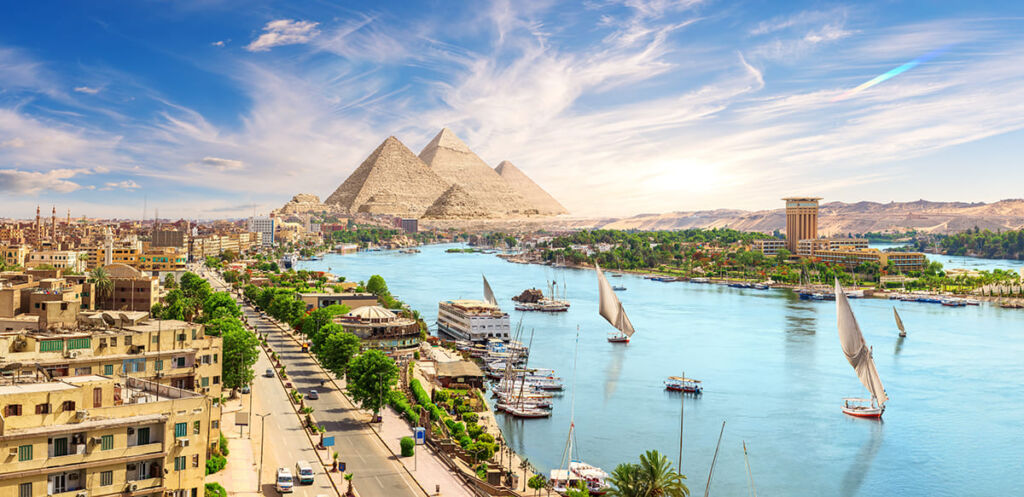Egypt is a transcontinental country spanning northeastern Africa and the Sinai Peninsula in Southwest Asia. It covers1001450km2 between the Mediterranean and Red Seas and is dominated by the life-giving Nile River delta. The name “Egypt” derives from the ancient Greek Aigyptos, itself from the Egyptian name Hwt-ka-Ptah meaning “Temple of the Soul of Ptah.” Egypt has about109000000 inhabitants, mainly concentrated along the Nile and in Greater Cairo. Arabic is the official language; English and French are widely used in commerce and tourism. Alcohol may be served to non-Muslims aged21 and over in licensed venues; narcotics are banned with severe penalties. Gambling is illegal except for licensed betting in some Red Sea resorts. The official state name is the Arab Republic of Egypt. The President is the head of state, the Prime Minister heads the government, and the unicameral parliament enacts laws. Defense and national security are managed by the Egyptian Armed Forces, one of Africa’s largest military bodies, overseen by the Supreme Council of the Armed Forces.
History
Human communities settled the Nile Valley by10000BC, taking advantage of seasonal floods to cultivate wheat, barley and flax. By3100BC the kingdoms of Upper and Lower Egypt were unified under Pharaoh Narmer, launching the Early Dynastic Period and the legendary era of the Old Kingdom (c2686–2181BC) when the Great Pyramids of Giza and the Sphinx were constructed. Royal authority rested on divine kingship, and centralized bureaucracy managed resources across fertile floodplains. After the First Intermediate Period a revival known as the Middle Kingdom (c2055–1650BC) extended control into Nubia and fostered literary and artistic achievements.
In c1550BC Ahmose I expelled the Hyksos invaders and founded the New Kingdom (c1550–1069BC), Egypt’s golden age. Under Hatshepsut, Thutmose III and particularly Ramses II the empire expanded into Syria and Nubia. Monumental temples at Karnak and Luxor and the rock-cut tombs of the Valley of the Kings testify to immense wealth and spiritual complexity. By the Twentieth Dynasty internal strife and economic strain preceded the Third Intermediate Period, and subsequent Late Period dynasties fell to successive foreign conquerors.
Persian kings ruled after c525BC until Alexander the Great conquered Egypt in332BC, founding Alexandria. After his death the Ptolemaic dynasty, begun by Ptolemy I Soter, blended Greek and Egyptian cultures, built the Lighthouse of Alexandria and patronized the Library. In30BC Cleopatra VII’s defeat by Rome brought Egypt into the Roman Empire. Under Roman and Byzantine rule the province remained wealthy and Christianized until the Islamic conquest in639AD by Arab armies under Amr ibn al-As.
For over six centuries Egypt was ruled by successive caliphates and sultanates, including the Tulunids, Fatimids and Mamluks, until Ottoman incorporation in1517. Though nominally under Istanbul, Mamluk elites retained autonomy. In1798 Napoleon’s expedition highlighted Egypt’s strategic value, but British and Ottoman forces expelled the French. Muhammad Ali Pasha then modernized the army, economy and bureaucracy from1805, inaugurating a dynasty that built railroads, schools and factories. British occupation began in1882, and the Suez Canal, opened in1869, became a vital artery of global trade.
Nationalist movements grew in the early20th century, leading to limited self-rule after World War I and full independence as the Kingdom of Egypt in1922, though British troops remained. King Farouk’s reign ended with the 1952 Free Officers’ coup led by Gamal Abdel Nasser, who abolished the monarchy and declared the republic in1953. Nasser’s nationalization of the Suez Canal in1956 asserted Egypt’s sovereignty and launched pan-Arabism. His successor Anwar Sadat shifted toward friendship with the United States, signed the Camp David Accords with Israel in1978, and was assassinated in1981. Hosni Mubarak then ruled until the 2011 revolution, which brought a brief democratic opening, followed by the 2013 military ouster of President Morsi. Under President Sisi since2014, security has tightened as the state balances stability, economic reform and human rights concerns.
Industry
Egypt’s economy combines hydrocarbons, textiles, food processing, cement and tourism. It is the birthplace of Arab Contractors, a major regional construction brand, and Cleopatra Group, a large ceramics and building materials manufacturer. Petroleum and natural gas production are industrial pillars, with Egypt serving as a regional energy hub via the Suez Canal and its branches. The chemical sector produces fertilizers, steel and plastics. Egypt boasts one of Africa’s largest cement outputs and leads regional exports of cotton textiles, setting records for annual garment shipments to Europe.
Flora and Fauna
Egypt’s ecosystems range from Mediterranean woodlands in the north to Sahara desert in the west and Red Sea coral reefs in the east. Endemic plants like the Sinai cyclamen and desert rose appear in mountainous wadis. Iconic fauna include the Nubian ibex, Dorcas gazelle and the endangered Egyptian vulture. The Red Sea reefs harbor clownfish, lionfish and endemics like the Sinai bannerfish. Dangerous species include the saw-scaled viper in deserts and box jellyfish offshore. Domesticated animals—camels, goats, donkeys—are integral to rural life. Export of protected species is prohibited; strict wildlife laws enforce CITES regulations.
Religion and Races
About90 percent of Egyptians are Sunni Muslim and10 percent Christian, mainly Coptic Orthodox. Small Bahá’í, Jewish and Shiite communities exist. Egyptians identify as ethnically Arab following 7th-century Arab migrations, alongside Nubian, Bedouin, Beja and other Afro-Asiatic groups. Religious holidays such as Eid al-Fitr, Eid al-Adha and Coptic Christmas shape annual rhythms. Traditions include Friday mosque prayers and Church liturgies, Ramadan fasting and Saint Day processions in Christian villages.
Wars and Conflicts
Ancient Egypt fought Libyan, Hittite and Nubian wars to secure borders. Modern conflicts began with the 1948 Arab-Israeli War, the 1956 Suez Crisis and the 1967 Six-Day War, when the Sinai was occupied by Israel. The 1973 Yom Kippur War regained the Sinai under UN mediation. Egypt led the Camp David peace process in1978. No large-scale wars have occurred since but Egypt contributes troops to UN peacekeeping in Congo and Africa. Military cemeteries dot Sinai and the Western Desert. Terrorist attacks such as the 1997 Luxor massacre and 2015 Sinai bombings have targeted tourists and security forces.
Standard of Living
Egypt’s GDP per capita is lower than global average but urban households in Cairo and Alexandria enjoy modern amenities. HDI stands at0.707 indicating medium human development. Transparency International ranks Egypt 117 of180 on the Corruption Perceptions Index, reflecting ongoing anti-corruption drives. Economic reforms since2016 IMF agreements aim to boost private investment, reduce subsidies and stabilize inflation.
Medicine
Public healthcare is provided by Ministry of Health hospitals; private clinics offer international standards in major cities. Pharmacies operate daily from08:00 to23:00 with some 24-hour outlets. Tourists should carry comprehensive travel insurance. Vaccinations for hepatitis A, typhoid and polio are recommended. Malaria risk is negligible in Nile Valley; dengue appears sporadically in the Red Sea governorates. Drink bottled water only.
Sport
Football is Egypt’s most popular sport, with Al Ahly and Zamalek clubs commanding ardent followings. The national team has won the Africa Cup of Nations seven times. Squash champions like Amr Shabana and Raneem El Weleily have dominated world rankings. Handball, volleyball and basketball also have strong leagues. Egypt has participated in every Summer Olympics since1912, earning medals in weightlifting, wrestling and fencing.
Holidays
Revolution Day on25 January commemorates the 2011 uprising. Sinai Liberation Day on25 April marks the final pullout of Israeli forces in1982. Labor Day on1 May and Revolution Day on23 July celebrate the1952 coup. Eid al-Fitr and Eid al-Adha follow the lunar calendar. Coptic Christmas on7 January and Easter in spring are significant for Christian Egyptians.
Traditions
Hospitality defines Egyptian culture; guests are offered tea and sweets. During Ramadan visitors should avoid eating or drinking in public during daylight hours. Women should dress modestly in rural areas, covering shoulders and knees. Handshakes are common; address elders first. Tourists in mosques should remove shoes and follow prayer schedules quietly.
Interesting Facts
Egypt built the world’s first pyramid at Djoser’s Step Pyramid in27th century BC. The Rosetta Stone discovered in1799 unlocked hieroglyphs. Film classics like “The Ten Commandments” and “Indiana Jones and the Last Crusade” were shot at Giza and Luxor. Iconic Egyptians include Cleopatra, Nefertiti and Nobel laureate Naguib Mahfouz. The Egyptian cotton cultivar Gossypium barbadense produces some of the world’s finest fibers.
Money
The Egyptian pound (EGP) is the currency. ATMs accept major cards in cities; rural areas may require cash. Exchange rates fluctuate around30EGP per1USD. Banks and licensed bureaus offer the best rates; avoid hotel exchanges. Credit cards are accepted in hotels and upscale restaurants but small vendors prefer cash. Tipping of10 percent in restaurants and2-5EGP to porters is customary.
Household Details
Electricity is220V at50Hz; outlets are type C and F. Mobile networks by Vodafone, Orange and Etisalat provide 4G coverage nationwide. Wi-Fi is available in hotels and cafes. Tap water is chlorinated but not always potable; bottled water is recommended.
Clothing
Lightweight, breathable fabrics suit Egypt’s climate. In religious sites both genders must cover shoulders and knees; women should avoid low-cut tops. Beachwear is fine at resorts but not in urban centers. Wide-brimmed hats and closed-toe shoes protect against sun and sand.
Tourism
A comprehensive Egypt itinerary spans10–14 days. Cairo requires3–4 days for the Pyramids, Egyptian Museum and Islamic Cairo. Luxor and Aswan take4–5 days, including Karnak, Valley of the Kings, Philae Temple and Abu Simbel. A3-day Nile cruise between Luxor and Aswan offers a paced view of riverine life. Red Sea resorts like Hurghada and Sharm El-Sheikh merit3–4 days for diving and relaxation. Day trips to Siwa Oasis or White Desert can be added.
Types of Tourism
Cultural tourism at Pharaonic temples, tombs and museums. Adventure tourism with desert safaris and hot air ballooning over Luxor. Beach tourism on the Red Sea coral reefs. Nile river cruises and felucca sails. Ecotourism in oases and protectorates. Religious tourism for Coptic and Islamic heritage sites.
List of Tourist Attractions
Great Pyramids of Giza and Sphinx – ancient royal necropolis, UNESCO
Karnak Temple Complex – the world’s largest ancient religious site, UNESCO
Valley of the Kings – New Kingdom royal tombs on the Nile’s west bank, UNESCO
Abu Simbel Temples – rock-cut monuments by Ramses II, relocated in1968, UNESCO
Historic Cairo – medieval mosques and bazaars, UNESCO
List of Non-Tourist Attractions
Wadi El Hitan – valley of the whales with fossil remains, remote UNESCO site
Dakhla Oasis mudbrick villages – off-grid desert communities preserving ancient customs
Fayoum Artisanal Workshops – handmade pottery and textiles in natural springs region
Qasr Qarun – Roman temple ruins in Fayoum depression, little-visited heritage site
El Kab – rock-cut tombs and ancient settlement east of Aswan
Local Cuisine
Koshari – rice, lentils, macaroni topped with spicy tomato sauce and fried onions
Ful Medames – slow-cooked fava beans with oil, cumin and lemon for breakfast
Ta’ameya – Egyptian falafel made from fava beans and fresh herbs
Mahshi – vine leaves and vegetables stuffed with rice, herbs and spices
Baklava and basbousa for sweets; local beers and arak spirits are available in some hotels
Breakfast7–9AM, lunch12–3PM, dinner7–10PM. Street-food vendors vary in hygiene; busy stalls are generally safer. Tip10-15 percent in restaurants.
Why Visit
Egypt offers a unique blend of ancient wonders, vibrant culture and modern amenities. Its monuments, desert landscapes and riverine life create an immersive journey through millennia of human achievement.
Safety for Tourists
Major tourist sites have robust security and police presence. Terrorist threats are low in managed zones but higher in North Sinai; travel there typically requires military permit. Scorpions and vipers inhabit deserts; guided tours reduce risk. CCTV covers most attractions and urban centers. Heatstroke and dehydration are risks; carry water and sun protection. Egyptians are hospitable; discrimination is rare though respect for local customs is expected.
Tourist Infrastructure
Five-star hotels and budget guesthouses abound in Cairo, Luxor and Sharm El-Sheikh. Tour operators offer multi-lingual guides. Visitor centers provide maps and ticketing. Domestic flights, trains and private vans ensure reliable transport.
Entry Rules
Most nationalities can obtain a30-day tourist visa on arrival for25USD, extendable once. E-visas are available in advance. Passport must be valid for six months. Customs prohibit antiquities, narcotics and undeclared cash over5000USD.
Transport
Cairo Metro and buses serve major cities; ride-hail apps operate in urban areas. Trains link Cairo with Alexandria, Luxor and Aswan. Domestic flights connect farther sites. Tickets for trains and planes can be booked online or at stations and airports.
Automobile
Driving is on the right; an International Driving Permit is recommended. Traffic is heavy in cities and road signs may lack English. Police checkpoints are common; bribery is illegal but occasional. No tolls on main highways, drink-driving laws enforced. Fuel is widely available. SUVs are preferred for desert travel. Fines vary from50 to500EGP depending on violation.
Noise Regulations
Residential areas observe quiet hours from22:00 to06:00. Religious celebrations and weddings may extend noise levels locally.
Daily Budget
Budget travelers need300–500EGP (10–16USD) per day for hostels, street food and public transport. Midrange travelers spend1500–2500EGP (50–80USD) per day for three-star hotels, guided tours and restaurants. Luxury travelers may exceed5000EGP (160USD) daily.
What Is Not Recommended
Do not photograph military sites or checkpoints. Avoid political demonstrations. Drones require government approval. Public displays of affection are frowned upon outside tourist resorts.
Climate
Egypt has a desert climate with hot, dry summers and mild winters. Coastal regions are moderate year-round. Best time to visit is October to April for cooler days and clear skies.
Travel Tips
Carry a universal adapter and photocopies of passports. Learn basic Arabic greetings. Schedule tomb visits early to avoid heat. Respect prayer times in mosques. Stay hydrated and use sunblock. Enjoy your journey through Egypt’s timeless landscapes and living heritage.
- Baikal facts
- Pura Vida on the Road: the nuances of traveling Costa Rica
- Barbados
- Indians
- Great Plains (USA)
- Panama
- The World’s Most Dangerous Countries for Tourism in 2025
- From trauma healers to in-house psychologists, hotels are increasingly catering to travellers’ mental health
- Liechtenstein
- Pirate treasure hunting around the world: where to look without breaking the law
- Sri-Lanka
- Georgia
- Namaqualand Flower Route
- Nanai
- Endemics of Baikal
- Istanbulkart Scams: What Tourists Should Watch Out For
- Turkmenistan
- Colombia
- Island
- Kubachi (Dagestan, Russia)












